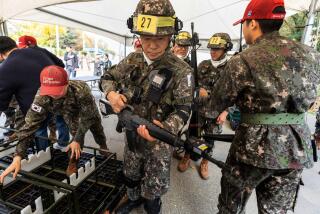In Iraq, a green idea for saving lives of troops
- Share via
FORWARD OPERATING BASE HAMMER, IRAQ — When a little-known agency of the U.S. Army asked Joe Amadee III to come up with an idea for saving lives in Iraq, it was probing for some kind of a contraption.
After all, the Rapid Equipping Force, a 5-year-old think tank for military innovation, had come up with some pretty high-tech stuff: robots to search caves in Afghanistan, an acoustic sniper finder and a hand-held laser pointer that soldiers use to flag down cars at night.
But, instead of a gadget, Amadee proposed a green solution.
And so, before long, he and a crew led by an Oklahoma roofing contractor were at this desert base east of Baghdad spraying foam onto tents.
Their plan is to turn all of the Army’s hulking, heat-absorbing tent barracks into rigid shells of 2-inch insulation.
The way that would improve soldiers’ lives may be self-evident. What is less obvious is how it also could save their lives.
The key is fuel: The more of it a base uses, the more soldiers are exposed to deadly roadside bombs on fuel convoys.
During the massive U.S. mobilization in Iraq there wasn’t much time to consider that fact. Dan Nolan, chief of the power task force at the Ft. Belvoir, Va.-based Rapid Equipping Force, said it came to him indirectly when a commander in Anbar province asked about hybrid electricity generation.
“What he’s really telling you is that the most dangerous thing in Anbar at that time was driving fuel to the Syrian border,” Nolan said.
Others in the Army were working on beefing up armor, so Nolan focused on reducing exposure.
The assignment went to Bruce D. Jette, former science advisor to the Army chief of staff, who founded the Rapid Equipping Force, or REF, and has since spun off a private company, Synovision Solutions, that contracts for the agency.
Jette, who has a doctoral degree from MIT, became a legend in Afghanistan when he suggested that the Army use robots instead of soldiers to search caves for Taliban fighters.
When commanders told him it would take months or years to build a robot program, Jette said he could do it in 45 days with off-the-shelf technology, and then did it in fewer.
Thus was born the idea of searching the civilian marketplace for goods that can be quickly adapted to military use.
When the fuel challenge came along, wind, solar, geothermal and trash generation were obvious solutions.
But Amadee, another REF veteran who works for Synovision, was drawn to insulation.
“Everybody in the military thought the answer was going to be power generation,” Amadee said. “I thought, ‘We’ve got to stop trying to cool the Horn of Africa.’ ”
Amadee teamed with Glencoe Insulation & Roofing of Glencoe, Okla. Its machines draw chemicals from 50-gallon drums into a mixture that sprays on like paint and expands into a thick layer of foam. A layer of ultraviolet protection goes next.
The foam isn’t cheap. Under an initial contract of about $2.6 million, the group is insulating 81 tents and several gyms. With security improving, the program is evolving into a hybrid of security, economics and comfort.
Soldiers are delighted with the comfort. Master Sgt. Pleasant L. Lindsey III, a public affairs officer at Multi-National Corps headquarters, said he used to avoid the gym at Forward Operating Base Victory in Baghdad until 3 a.m., when it had cooled.
“It was a steam bath even with the fans blowing and the air conditioning,” Lindsey said. “Now, I use the gym during the day.”
As for the economics, Brig. Gen. Edward C. Cardon, the 3rd Infantry Division’s deputy commander for support, said he would evaluate the program after the trial phase to decide how it would fit in with the Army’s long-range plans.
Cardon said he found the results promising, but wasn’t sure the investment would pay off unless a tent was expected to be in service at least a year.
Nolan, chief of the energy program, says the price, about $30,000 a tent, is worth it. Preliminary data show that insulating tents can cut a base’s fuel usage by 40%, he said.
At $20 a gallon -- the cost to deliver fuel to a base in Iraq -- “that’s a lot of diesel that doesn’t need to be used,” Nolan said.
Meanwhile, Jette is looking for even more novel pathways to his ultimate dream: the zero- energy base.
There’s cooking oil, for example. A large base may throw out 475 gallons a week. That could produce 300 gallons of fuel and a lot of soap, he said.
--
More to Read
Sign up for Essential California
The most important California stories and recommendations in your inbox every morning.
You may occasionally receive promotional content from the Los Angeles Times.










